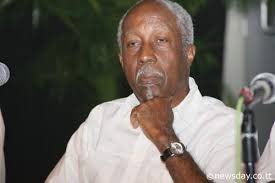A good soldier stands at ease

Reginald Dumas died on March 7, bringing to an end many decades of committed work.
Mr Dumas was 88, but after spending three decades in the public service in a range of diplomatic and management roles, he had never truly retired. His wisdom and experience were continuously offered in an effort to improve the nation’s understanding of the value of a functioning public service.
He was among the last of a cohort of leaders who shaped the earliest versions of the Public Service, working to engineer it to become more than a colonial artifact.
An island scholar in 1952, he studied at Cambridge University before returning to serve the Federal Government from 1959-1962. He then accepted a Carnegie scholarship for diplomatic training in the Federal Foreign Service.
With the collapse of the Federation, he served the newly independent Trinidad and Tobago instead, making his mark in diplomatic postings from the US to Ethiopia, Canada and India, among other nations. He would retire as Permanent Secretary to the Prime Minister and head of the Public Service.
Mr Dumas fought to keep the service robust as it executed political policy. He was clear that to be a useful public servant, the emphasis should be on a commitment to service, not servitude.
He did not wander far thereafter, chairing the Public Service Reform Task Force, whose unimplemented recommendations he never failed to lament.
He was a co-founder of the Trinidad and Tobago Transparency Institute, and continued writing in advocacy of transparency in governance and the value of civil discourse in politics, demonstrating by example what he often found in short supply in Parliament and on political podiums.
He never failed to offer firm guidance politicians on their faux pas, to point out errors of governance procedure or to clarify apparently convoluted political matters with elegance. A rebuff from Mr Dumas was often more educational than a lecture on the subject could ever hope to be.
That he did so in recent years regularly in this newspaper remains a source of pride for us.
Born in Tobago and a child of Tobagonians, Mr Dumas chose to live his retirement years there; there is a poetic circle in his life’s ending on the island where it began.
Much of his concern during recent years was directed to the efforts of the new Chief Secretary and his young executive, and he commented on their work both as an experienced public servant and as a concerned member of Tobago’s Council of Elders.
That council is now bereft of one brilliant mind; Trinidad and Tobago has lost a wellspring of intelligent comment and clarity on matters of governance; and his family has lost their pillar.
Reginald Dumas will be missed.

Comments
"A good soldier stands at ease"